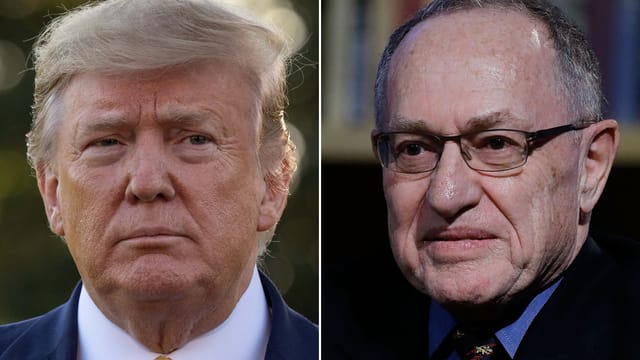
In Robert Louis Stevenson's classic gothic horror novel, "The Strange Case of Dr. Jekyll and Mr. Hyde," a learned medical doctor struggles to control the evil alter-ego he has unleashed by ingesting a serum of his own making. The story is an apt metaphor for the predicament President Donald Trump's legal defense team faces: struggling to integrate learned, high-powered legal expertise with the crass hyperbole and the name-calling tactics that characterize the Presidents' typical approach. As evidenced by their briefings thus far, the strain is already showing.
On the Jekyll side, White House Counsel Pat Cipollone, leads a team that includes such legal luminaries as professor Alan Dershowitz and Ken Starr, a former federal appeals court judge. Both Dershowitz and Starr have suffered blows to their reputations over the years. Dershowitz has been criticized for his relations with, and representation of, sex trafficker Jeffrey Epstein. Starr is often thought of as the prosecutor who turned a real estate investigation (Whitewater) into a sex scandal probe (Monica Lewinsky), which ultimately led to his ethics adviser quitting.
In another blow to his reputation, Starr was forced to step down from being president of Baylor University amid allegations that under his leadership Baylor had been indifferent to campus sexual assaults. But despite their loss of standing there is no question that they remain top-shelf legal talent with elite academic credentials.
In their briefings, Trump's team has begun to mount a substantive legal defense that Trump was engaging in foreign policy. Under this theory, Trump's withholding of military aid to Ukraine, allegedly in return for Ukraine announcing that they would open an investigation into his political rival former Vice President Joe Biden, could have potentially advanced some public interest and therefore would not be corrupt.
Whatever the factual weaknesses of this argument -- such as Trump's instruction that Ukraine President Volodymyr Zelensky should work with Trump's personal attorney, Rudy Giuliani, and diplomat David Holmes' testimony that Ambassador Gordon Sondland characterized Trump as not giving a "sh*t" about Ukraine -- the argument might be able to change the focus from one about legality to one about Trump's perhaps incompetent and ignorant understanding of foreign policy.
If Trump's defense team can portray the impeachment articles as merely arising from partisan criticism of Trump's competence as opposed to an abuse of power or obstruction of Congress then they have at least an argument that passes the laugh test. Most constitutional scholars agree that the framers did not want presidents impeached for maladministration -- meaning doing a really bad job.
But then the Mr. Hyde nature of Trump's team emerges to cloud this erudite legal argument. Trump's lawyers' efforts to act like learned counsel are quickly undermined by their equal devotion to echoing Trump's rallying cries. On a memo Dershowitz and Starr did not sign, the team has stated that the impeachment is rigged, have called Chairman Adam Schiff a liar and claimed much of the House impeachment inquiry was carried in out in secret in a basement (they mean the Sensitive Compartmented Information Facility used by the House Intelligence Committee).
Starr for his part, has called Jerry Nadler incoherent and "over the top."
Dershowitz's media blitz is the best evidence of a fast descent into Mr. Hyde territory. He now insists that impeachment requires a crime to have been allegedly committed by the President, shamelessly contradicting his 1998 legal position that impeachment does not require evidence of a crime. As many have pointed out, the Constitution hasn't changed since 1999, so it's clear it is Dershowitz who has.
Because it is a foregone conclusion that the Republican-controlled Senate will not vote to remove Trump, the significant effects of this Jeckyll and Hyde struggle will not be seen in the outcome of the impeachment trial. But the American people will see this struggle of identities within the Trump legal team. Their views will be heard in a verdict handed down in the 2020 elections, which will be decided by which party wins over a greater number of moderates, independents and liberals.
Those voters, not the crowds at Trump's frequent campaign rallies, will determine the future of Trump and the Republican party. For them, the Mr. Hyde on display in Trump's legal defense team will be a reminder of how America has already lived with Mr. Hyde for the past three years.
And now a spoiler for those who haven't read the book: The story ends badly for both Jekyll and Hyde.